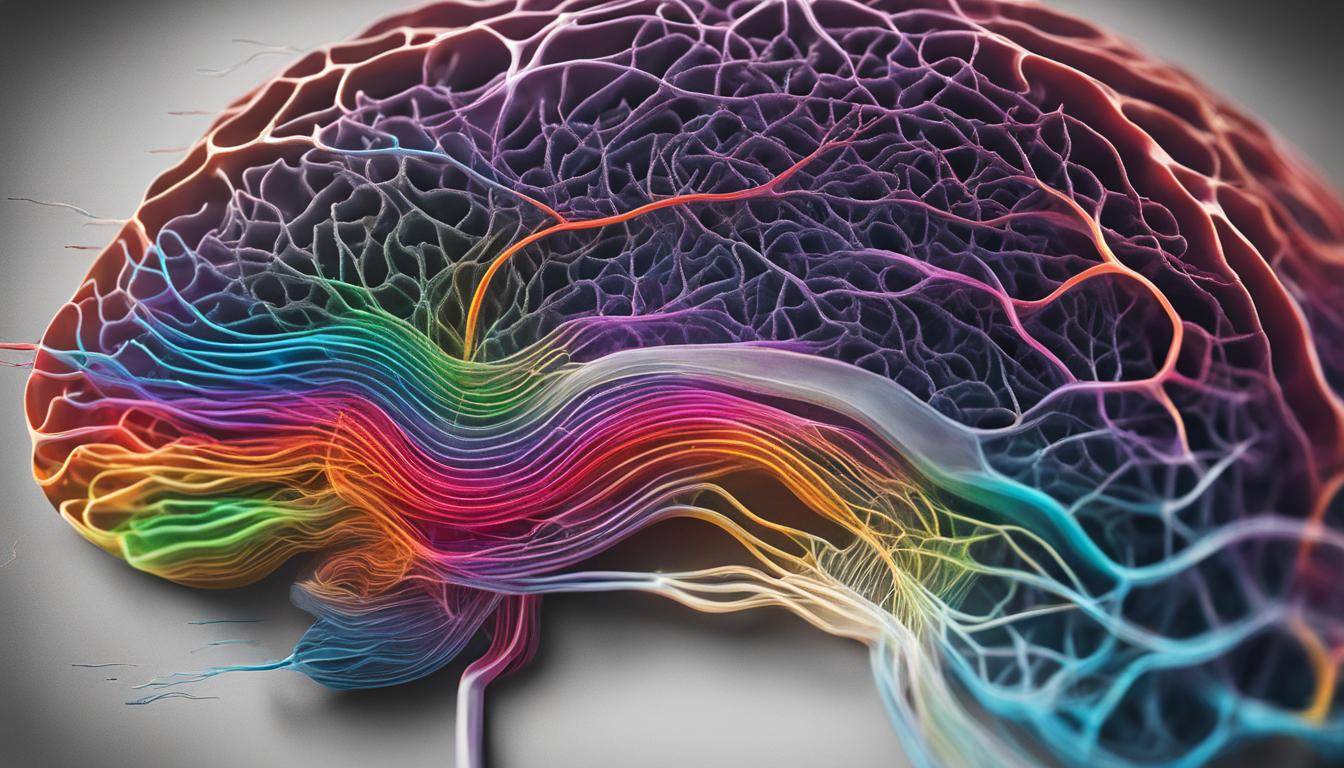Setting goals is a fundamental aspect of personal and professional growth. But have you ever wondered what goes on in your brain when you set and pursue your goals?
The field of neuroscience has provided fascinating insights into the neurocognitive aspects of goal setting, uncovering the neural mechanisms that drive our behavior and influence our chances of success.
In this article, we will explore the emerging science behind goal setting, delving into the neuroscientific principles and cognitive neuroscience of setting goals.
By understanding the inner workings of your brain, you can optimize your goal-setting strategies and unlock your full potential.
Key Takeaways:
- Neuroscience offers valuable insights into the motivational and cognitive dimensions of behavior change.
- Understanding neural mechanisms of goal setting can enhance your goal-setting strategies.
- Cognitive neuroscience explores the relationship between the brain and goal attainment.
- Neuroplasticity, the brain’s ability to adapt, plays a crucial role in goal setting.
- By leveraging neuroscience knowledge, you can optimize your personal and professional growth.
The Psychology of Goal Setting
Setting goals goes beyond simply defining what you want to achieve; it also has deep psychological implications. The process of goal setting taps into your motivation, self-esteem, and self-confidence, unlocking your potential for personal and professional success.
Research has consistently shown that individuals who set ambitious goals tend to perform better and achieve higher levels of productivity.
When you challenge yourself with specific targets, you activate your intrinsic motivation, driving you to push beyond your limits and accomplish more than you thought possible.
Moreover, goal setting has a positive impact on your self-esteem and self-confidence. When you set goals and take purposeful action towards their attainment, you experience a sense of accomplishment and fulfillment.
This boosts your self-esteem and bolsters your belief in your abilities, empowering you to tackle even more significant challenges with confidence.
“Setting goals is the first step in turning the invisible into the visible.” – Tony Robbins
Goal-Setting and Motivation
Goal setting is intimately linked to motivation. By setting clear, specific goals, you provide yourself with a target to strive for, which creates a sense of purpose and direction.
When your goals align with your values and desires, you ignite a powerful motivation that propels you forward.
- Inspiration: Goals inspire you and give you a compelling reason to take action. They provide a roadmap to success and give you something to look forward to achieving.
- Focus: By setting goals, you focus your attention on what truly matters to you. This helps you filter out distractions and concentrate your efforts on the most meaningful tasks.
- Momentum: Accomplishing smaller, manageable goals along the way creates a positive feedback loop, boosting your motivation and propelling you toward more significant achievements.
Goal setting is a powerful psychological tool that can transform your mindset and drive you towards success.
By understanding the psychology behind goal setting and leveraging it to your advantage, you can unlock your full potential and create a path to fulfillment and accomplishment.
Goal Setting Theory: A Closer Look
Goal setting theory, proposed by Edwin A. Locke and Gary P. Latham, provides a framework for understanding how effective goals are set. This theory emphasizes the importance of setting goals that are achievable, believable, and committed, known as the A-B-C of goals. Additionally, the SMART goal-setting rule (specific, measurable, attainable, realistic, time-bound) is a practical tool that helps individuals plan and execute their goals effectively.
| Goal Setting Theory | A-B-C of Goals | SMART Goals |
|---|---|---|
| Proposed by Edwin A. Locke and Gary P. Latham | Stands for achievable, believable, and committed goals | Specific, measurable, attainable, realistic, time-bound goals |
| Focuses on effective goal setting | Goals that are within reach, meaningful, and pursued with dedication | Goals that are clear, trackable, feasible, aligned with reality, and have a deadline |
| Provides a framework for understanding goal attainment | Helps individuals set goals that they genuinely believe they can accomplish | A practical tool for planning and executing goals with clarity and focus |
The A-B-C of goals ensures that the goals set are realistic and aligned with an individual’s capabilities and commitment. By setting achievable goals, individuals are more likely to stay motivated and maintain a sense of progress.
SMART goals, on the other hand, provide a clear structure for goal setting, making them easier to track and measure.
This increases accountability and allows individuals to make necessary adjustments along the way to ensure goal success.
Goal setting theory also highlights the link between effective goal setting and productivity.
When individuals set meaningful and challenging goals for themselves, they become more engaged and energized, leading to increased productivity and performance.
By understanding the principles of goal setting theory and applying the A-B-C of goals and SMART goals, individuals can optimize their goal-setting strategies and enhance their chances of achieving success.
The Neuroscience of Goals and Behavior Change
Neuroscience research has uncovered fascinating insights into how goals influence our behavior and facilitate behavior change.
The neural mechanisms underlying goal setting have been a subject of great interest, shedding light on the neuroplasticity and neurobiology involved in goal achievement.
By understanding the brain’s response to goals, we can optimize our goal-setting strategies and increase our chances of success.
Neuroplasticity, the brain’s ability to reorganize and adapt, plays a crucial role in goal setting.
Studies have shown that when we set goals and work towards them, the connections between neurons become stronger, allowing for efficient information processing and increased cognitive flexibility.
This neuroplasticity supports the development of new habits and behaviors, assisting us in achieving our goals.
The neurobiology of goal setting
Goals stimulate several key areas of our brain, including the prefrontal cortex, the region responsible for executive functions such as decision-making and planning. When we set goals, this area becomes activated, initiating the necessary cognitive processes to achieve them. Additionally, the brain’s reward system, centered in the ventral striatum, responds to the anticipation and attainment of goals, releasing dopamine and creating a sense of motivation and satisfaction.
Understanding the neurobiology of goal setting provides valuable insights into our behavior change process. It allows us to harness the power of our brain’s inherent adaptability and utilize effective strategies to overcome challenges and achieve our desired outcomes.
By aligning our goals with the neurocognitive aspects of goal setting, we can enhance our motivation, focus, and overall performance, ultimately leading to greater success in both personal and professional domains.
In summary, the neuroscience of goals uncovers the fascinating neural mechanisms that underlie behavior change. Neuroplasticity and the neurobiology of goal setting illuminate how our brain responds to goals and adapts to facilitate their achievement.
By utilizing this knowledge, we can optimize our goal-setting strategies and empower ourselves to make lasting, positive changes in our lives. So, embrace the power of neuroscience in goal setting and unlock your full potential for success.
The Role of Rewards and Motivation
Motivation is a key factor in goal setting and behavior change. The brain responds positively to rewards, which can enhance motivation and drive individuals to achieve their goals.
When you set goals and create a plan to accomplish them, it’s crucial to consider the role of rewards in keeping you motivated throughout the journey.
“Rewards are the fuel that keeps you going. They provide a sense of accomplishment and satisfaction, reinforcing your commitment to the goal,” says Dr. Sarah Johnson, a leading expert in neuroscience and behavior change.
“When you know there’s a reward waiting for you at the end, your brain releases dopamine, the ‘feel-good’ neurotransmitter that boosts motivation and pleasure.”
But rewards are not limited to external incentives like money or material possessions. Intrinsic motivation, or the internal drive to pursue goals for personal satisfaction and growth, is equally important.
In fact, research has shown that goals aligned with personal values and interests are more likely to drive intrinsic motivation, leading to greater satisfaction and long-term success.
“Intrinsic motivation is like an inner compass that guides your actions. When you set goals that resonate with who you are and what you truly desire, you tap into a wellspring of motivation that fuels your progress,”
Maximizing Motivation: Tips for Goal Setting
- Align your goals with your values and passions. Choose goals that are personally meaningful to you, as this will enhance intrinsic motivation and make the journey more fulfilling.
- Break down big goals into smaller, achievable milestones. Celebrating small wins along the way will provide a sense of progress and keep you motivated to reach the next milestone.
- Design a reward system that works for you. Whether it’s treating yourself to a favorite activity or taking time off to relax, find ways to reward yourself for achieving milestones and completing tasks.
- Stay committed and resilient. Goal setting is not always easy, and setbacks are inevitable. But maintaining a positive mindset and having the determination to overcome obstacles will keep your motivation high.
By understanding the role of rewards and motivation in goal setting, you can optimize your strategies for success. Whether it’s external incentives or internal gratification, rewards play a crucial part in keeping you motivated on your journey towards achieving your goals.

Goal Setting Case Studies
Real-life examples of goal achievement can provide powerful inspiration and guidance for your own journey. Here are three success stories that demonstrate the transformative power of effective goal setting.
Case Study 1: From Couch to 5K
Sarah, a busy working professional, made a commitment to prioritize her health and fitness. She set a goal to complete a 5K run within six months, despite being a self-proclaimed couch potato.
Sarah started by creating a specific training plan, gradually increasing her running distance and intensity. She also enlisted the support of a running group for motivation and accountability.
Through consistent effort and staying committed to her goal, Sarah successfully completed her first 5K race within the timeframe she set.
Along the way, she experienced physical and mental transformations, developing newfound confidence and a sense of accomplishment. Sarah’s story highlights the importance of setting realistic goals, breaking them down into manageable steps, and seeking support to stay motivated.
Case Study 2: Launching a Successful Startup
David, an aspiring entrepreneur, had a vision to create a tech startup that would revolutionize the industry. He set ambitious goals to develop a minimum viable product, secure funding, and launch his business within a year.
David began by conducting extensive market research, refining his business plan, and building a prototype.
Despite facing numerous obstacles and setbacks, David persisted and remained focused on his goals. He leveraged his network to secure investments and assembled a dedicated team.
After months of hard work, David successfully launched his startup, receiving widespread acclaim and achieving the goals he had set for himself. David’s story serves as a reminder of the importance of perseverance, adaptability, and strategic planning in achieving ambitious goals.
Case Study 3: Climbing Mount Everest
Mark, an avid adventurer, set a monumental goal to climb Mount Everest. Recognizing the physical and mental challenges ahead, Mark embarked on a rigorous training program, honing his mountaineering skills, and building the necessary strength and endurance.
He also enlisted the guidance of experienced climbers and formed a supportive team.
After years of intense preparation and multiple attempts, Mark stood atop the summit of Mount Everest, achieving his lifelong dream. His journey was not without difficulties, but Mark’s unwavering determination and commitment to his goal propelled him forward.
Mark’s story exemplifies the importance of resilience, dedication, and a growth mindset when pursuing audacious goals.
| Case Study | Goal | Obstacles | Strategies | Outcome |
|---|---|---|---|---|
| Sarah | Complete a 5K run | Lack of fitness and motivation | Specific training plan, running group support | Successfully completed 5K race |
| David | Launch a tech startup | Funding, market competition | Market research, business plan refinement, networking | Successfully launched startup |
| Mark | Climb Mount Everest | Physical and mental challenges | Rigorous training, expert guidance, teamwork | Summited Mount Everest |
These goal setting case studies highlight the power of determination, planning, and perseverance. Whether it’s improving your fitness, launching a business, or conquering personal challenges, setting clear goals and taking focused action can help you achieve remarkable results.
Learn from these success stories, adapt the strategies to your own situation, and embark on your own journey towards accomplishing your goals.
The Power of Goal Setting in Positive Psychology
Goal setting is not only a powerful tool for achieving personal and professional success but also plays a significant role in the field of positive psychology. Positive psychology emphasizes the importance of setting goals to enhance happiness and overall well-being.
By being intentional about the goals you set, you can cultivate a sense of purpose and direction in your life, leading to greater life satisfaction.
Research has shown that individuals who actively engage in goal setting are more likely to experience positive emotions, greater self-esteem, and increased motivation.
When you set clear and attainable goals that align with your values and desires, you create a roadmap for personal growth and fulfillment. The act of setting goals allows you to focus your attention, set priorities, and take meaningful action towards the life you envision.
Incorporating goal setting into your daily life can have profound effects on your well-being. It provides a sense of structure and purpose, giving you a reason to wake up each day with enthusiasm and drive.
By setting goals that are challenging yet achievable, you fuel your inner motivation and create a positive feedback loop of progress and accomplishment.
“Goals provide the energy source that powers our lives. One of the best ways we can get the most from the energy we have is to focus it. That is what goals can do for us; concentrate our energy.” – Denis Waitley
Benefits of Goal Setting in Positive Psychology:
- Enhanced happiness and life satisfaction
- Increased sense of purpose and meaning
- Greater self-awareness and personal growth
- Boosted motivation and drive
- Improved overall well-being
By harnessing the power of goal setting, you can actively shape the direction of your life and create a positive impact on your mental and emotional well-being.
Setting goals that align with your values and aspirations allows you to live a more purposeful and fulfilling life, experiencing greater happiness and satisfaction along the way.
Table: The Impact of Goal Setting on Positive Psychology
| Benefits | Explanation |
|---|---|
| Enhanced happiness and life satisfaction | Setting and achieving meaningful goals promotes positive emotions and a sense of fulfillment. |
| Increased sense of purpose and meaning | Goal setting provides a sense of direction and clarity, allowing individuals to live with intention. |
| Greater self-awareness and personal growth | Reflecting on goals and progress fosters self-reflection and personal development. |
| Boosted motivation and drive | Having clear goals to work towards increases intrinsic motivation and overall productivity. |
| Improved overall well-being | Goal setting provides a framework for enhancing different areas of life, leading to overall improvement in well-being. |
Conclusion
In conclusion, the neuroscience of goal setting provides us with valuable insights into the intricate mechanisms behind successful goal achievement.
By understanding the motivational and cognitive dimensions of behavior change, you can optimize your goal-setting strategies and increase your chances of success.
Goal setting is not just about setting desired outcomes; it is about understanding how your brain responds to goals and leveraging that knowledge to drive personal and professional growth.
Through the power of neuroplasticity, your brain can reorganize and adapt to help you reach your goals.
By aligning your goals with your personal values and desires, and incorporating intrinsic motivation and rewards, you can enhance your drive and increase your chances of achieving your goals.
Remember, goal setting is a journey that requires strategic planning, motivation, and perseverance.
So, embrace the neuroscience of goal setting and unlock your true potential. Set ambitious yet achievable goals, break them down into specific and measurable actions, and stay committed.
With the power of neuroscience on your side, you can overcome obstacles, reach new heights, and create a life of fulfillment and success.
FAQ
What is the neuroscience behind goal setting?
Goal setting is closely linked to neuroscience, as it involves understanding how the brain responds to goals and behavior change. Neuroplasticity, the brain’s ability to reorganize and adapt, plays a crucial role in goal setting.
By understanding the neural mechanisms underlying behavior change, individuals can optimize their goal-setting strategies and increase their chances of success.
How does goal setting affect motivation and self-esteem?
Goal setting has been linked to higher motivation, self-esteem, and self-confidence. Setting ambitious goals can enhance motivation and drive individuals to perform better.
By setting specific and attainable goals, individuals can boost their self-esteem and develop a sense of accomplishment. Goal setting provides a sense of purpose and direction, contributing to personal and professional success.
What is the goal-setting theory?
The goal-setting theory, proposed by Edwin A. Locke and Gary P. Latham, provides a framework for understanding effective goal setting.
The A-B-C of goals (achievable, believable, committed) and the SMART goal-setting rule (specific, measurable, attainable, realistic, time-bound) are integral parts of this theory.
By setting goals that are challenging yet attainable, individuals can plan and execute their goals effectively, leading to increased productivity and goal attainment.
How can rewards and motivation impact goal setting?
Motivation plays a key role in goal setting. The brain responds positively to rewards, which can enhance motivation and drive individuals to achieve their goals.
By aligning goals with personal values and desires, individuals can tap into intrinsic motivation. Understanding the role of rewards and motivation in goal setting can help individuals stay motivated and focused on their goals.
Are there any real-life examples of successful goal setting?
Absolutely! Real-life case studies provide valuable insights into the practical application of goal setting. These examples showcase individuals who have successfully achieved their goals through strategic planning, motivation, and perseverance.
These stories serve as inspiration and highlight the power of goal setting in personal and professional growth.
How does goal setting relate to positive psychology?
Goal setting is closely linked to positive psychology, as it can enhance happiness and well-being. Setting goals provides individuals with a sense of purpose and direction, leading to greater life satisfaction.
By incorporating goal setting into their lives, individuals can experience the potential benefits of positive psychology and cultivate a fulfilling and meaningful life.
How can I optimize my goal-setting strategies?
To optimize your goal-setting strategies, it is important to understand the neuroscience behind goal setting and behavior change. By leveraging the motivational and cognitive dimensions of goal setting, you can enhance your chances of success.
Set specific, attainable, and time-bound goals that align with your personal values and desires. Stay motivated and focused on your goals, and be open to adapt and grow along the way.




























































